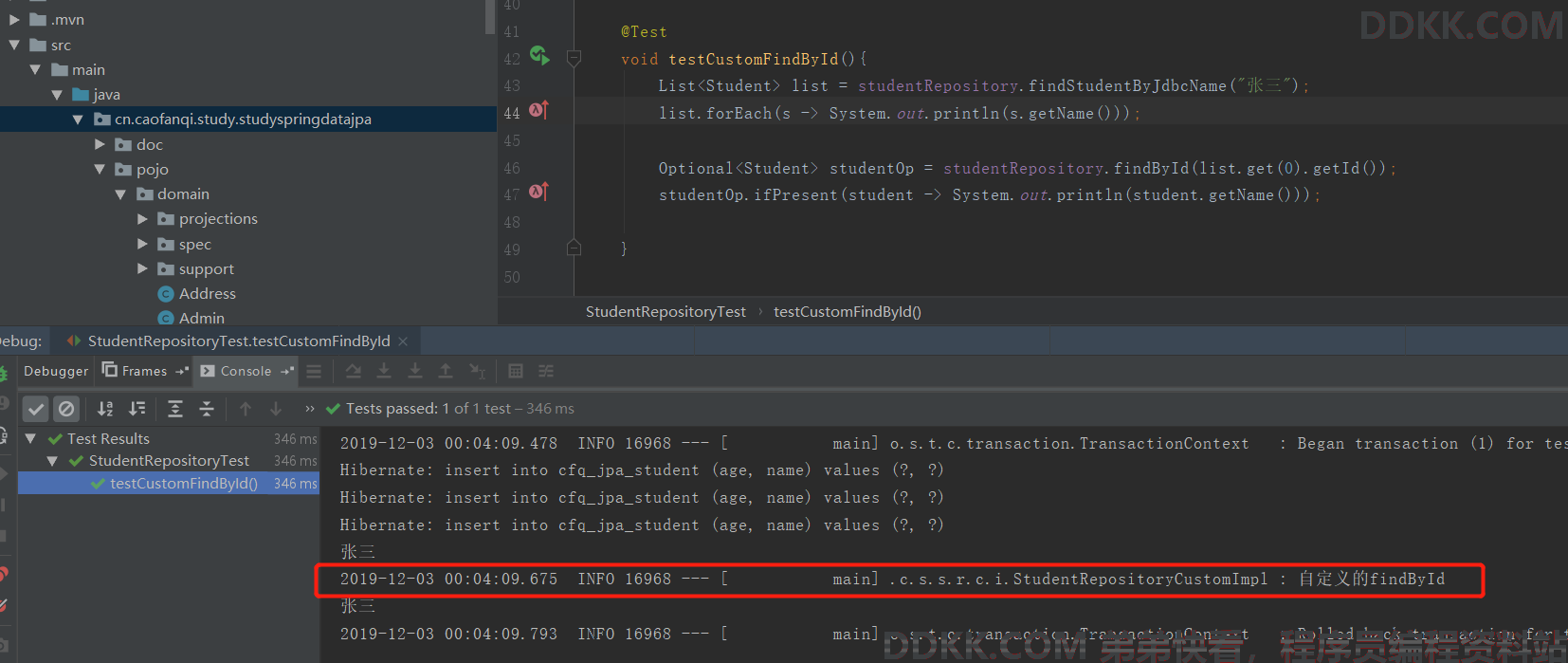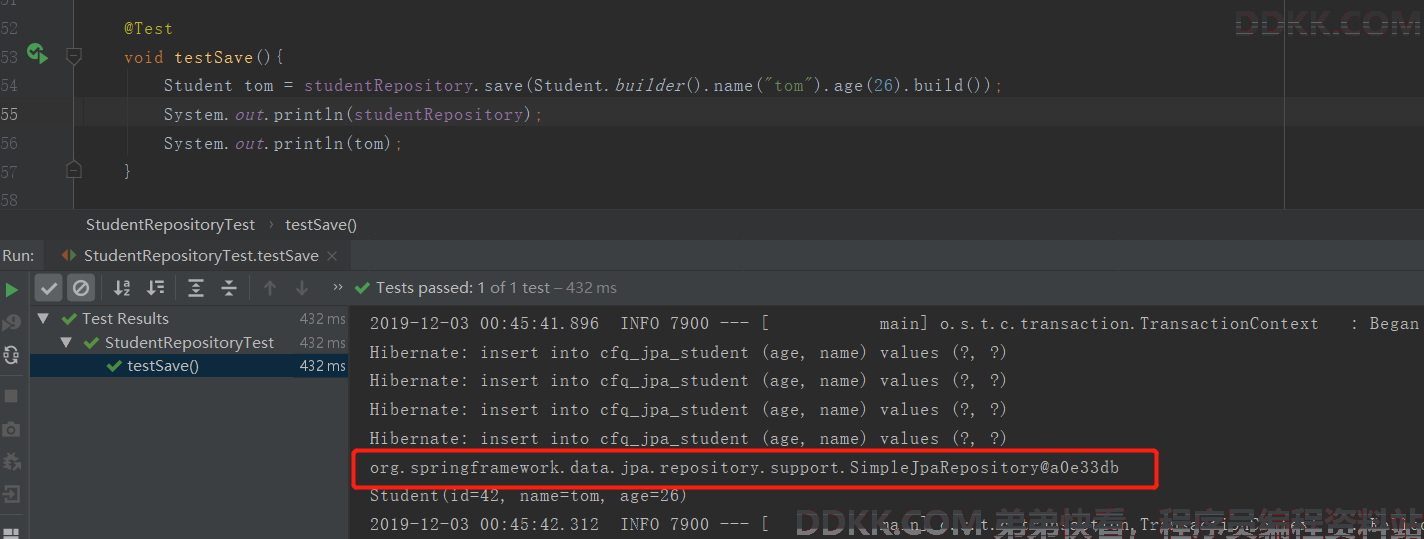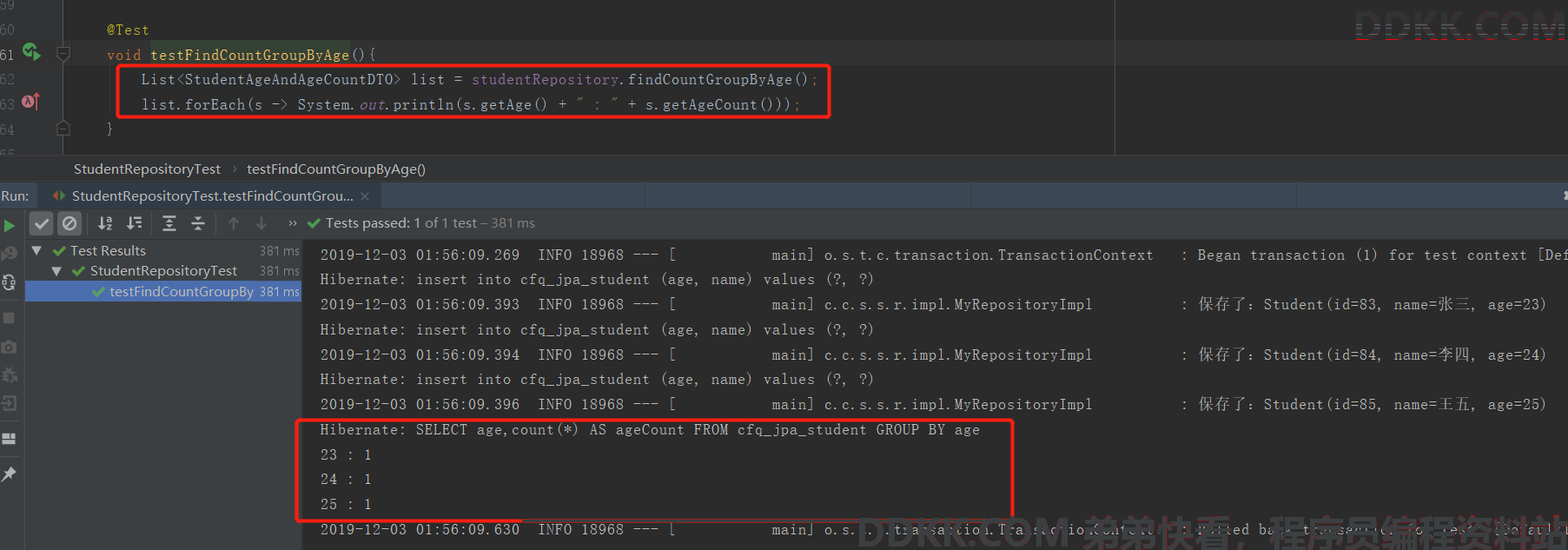14、Spring Data JPA 实战 - 自定义Repository
有些时候,我们需要自定义Repository实现一些特殊的业务场景。
1、自定义单个Repository
1.1、首先提供一个片段接口和实现(接口的实现默认要使用Impl为后缀,实现本身不依赖spring-data,可以是常规的spring-bean,所以可以注入其他的bean,例如JdbcTemplate)。
/**
* @author DDKK.COM 弟弟快看,程序员编程资料站
*/
public interface StudentRepositoryCustomJdbc {
List<Student> findStudentByJdbcName(String name);
}
/**
* 默认要以Impl结尾
* @author DDKK.COM 弟弟快看,程序员编程资料站
*/
public class StudentRepositoryCustomJdbcImpl implements StudentRepositoryCustomJdbc {
@Resource
private JdbcTemplate jdbcTemplate;
@Override
public List<Student> findStudentByJdbcName(String name) {
String sql = "SELECT * FROM cfq_jpa_student WHERE name = " + "'" + name + "'";
return jdbcTemplate.query(sql, BeanPropertyRowMapper.newInstance(Student.class));
}
}
1.2、自己的Repository继承自定义接口,就可以使用拓展的功能了。
/**
* 继承jpa的repository,和自己自定义的扩展
* @author DDKK.COM 弟弟快看,程序员编程资料站
*/
public interface StudentRepository extends JpaRepositoryImplementation<Student,Long>, StudentRepositoryCustomJdbc {
}
1.3、测试如下:
@BeforeEach
void setup(){
Student s1 = Student.builder().name("张三").age(23).build();
Student s2 = Student.builder().name("李四").age(24).build();
Student s3 = Student.builder().name("王五").age(25).build();
studentRepository.saveAll(Lists.newArrayList(s1,s2,s3));
}
@Test
void testFindStudentByJdbcName(){
List<Student> list = studentRepository.findStudentByJdbcName("张三");
list.forEach(s -> System.out.println(s.getName()));
}
1.4、控制台打印:
Hibernate: insert into cfq_jpa_student (age, name) values (?, ?)
Hibernate: insert into cfq_jpa_student (age, name) values (?, ?)
Hibernate: insert into cfq_jpa_student (age, name) values (?, ?)
张三
1.5、自定义扩展可以有多个。自定义的优先级高于spring-data为我们提供的。
/**
* 继承jpa的repository,和自己自定义的扩展
* @author DDKK.COM 弟弟快看,程序员编程资料站
*/
public interface StudentRepository extends JpaRepositoryImplementation<Student,Long>, StudentRepositoryCustomJdbc,StudentRepositoryCustom<Student,Long> {
}
/**
* 自定义student功能
*
* @author DDKK.COM 弟弟快看,程序员编程资料站
*/
public interface StudentRepositoryCustom<T,ID> {
Optional<T> findById(ID id);
}
/**
* 自定义实现repository功能
*
* @author caofnqi
*/
@Slf4j
public class StudentRepositoryCustomImpl<T,ID> implements StudentRepositoryCustom<T,ID> {
@PersistenceContext
private EntityManager entityManager;
@Override
public Optional<T> findById(ID id) {
log.info("自定义的findById");
T t = (T) entityManager.find(Student.class, id);
return Optional.of(t);
}
}

1、 6、可以通过@EnableJpaRepositories的repositoryImplementationPostfix属性自定义后缀,默认是Impl;
/**
* 启动类
* @author DDKK.COM 弟弟快看,程序员编程资料站
*/
@SpringBootApplication
@EnableAsync
@EnableJpaRepositories(repositoryImplementationPostfix = "MyPostfix")
public class StudySpringDataJpaApplication {
public static void main(String[] args) {
SpringApplication.run(StudySpringDataJpaApplication.class, args);
}
}
2、自定义BaseRepository
2.1、SpringDataJpa为我们提供的代理类其实是SimpleJpaRepository。

2.2、如果我们想要对所有的Repository的保存操作都进行记录日志,我们可以自定义BaseRepository,来充当代理类。(还可以是逻辑删除等场景)
2.2.1、自定义baseRepository
/**
* 自定义base Repository
*
* @author DDKK.COM 弟弟快看,程序员编程资料站
*/
@Slf4j
public class MyRepositoryImpl<T,ID> extends SimpleJpaRepository<T,ID> {
private final EntityManager entityManager;
MyRepositoryImpl(JpaEntityInformation entityInformation, EntityManager entityManager) {
super(entityInformation, entityManager);
this.entityManager = entityManager;
}
@Override
public <S extends T> S save(S entity) {
S save = super.save(entity);
log.info("保存了:{}",save);
return save;
}
}
2.2.2、告知Spring-Data-Jpa使用我们自定义的baseRepository
/**
* 启动类
* @author DDKK.COM 弟弟快看,程序员编程资料站
*/
@SpringBootApplication
@EnableAsync
@EnableJpaRepositories(
/*queryLookupStrategy = QueryLookupStrategy.Key.CREATE_IF_NOT_FOUND*/
/* ,repositoryImplementationPostfix = "MyPostfix",*/
repositoryBaseClass = MyRepositoryImpl.class)
public class StudySpringDataJpaApplication {
public static void main(String[] args) {
SpringApplication.run(StudySpringDataJpaApplication.class, args);
}
}
2.2.3、再次测试testSave方法,如下

3、entityManager执行原生复杂sql返回DTO
使用方法派生查询和@Query注解查询时,我们可以使用投影来面向对象编程,但是使用entityManager执行原生sql复杂sql时,怎么返回实体呢?如下:
3.1、DTO
/**
* entityManager使用的结果映射,需要一个无参构造函数与set方法,这一点与投影不一样
* @author DDKK.COM 弟弟快看,程序员编程资料站
*/
@Data
@NoArgsConstructor
@AllArgsConstructor
public class StudentAgeAndAgeCountDTO {
private Integer age;
private Long ageCount;
}
3.2、查询方法
public List<StudentAgeAndAgeCountDTO> findCountGroupByAge(){
/*
*sql可以是更复杂的
*/
String sql = "SELECT age,count(*) AS ageCount FROM cfq_jpa_student GROUP BY age ";
Query nativeQuery = entityManager.createNativeQuery(sql);
nativeQuery.unwrap(NativeQuery.class)
//设置类型
.addScalar("age", StandardBasicTypes.INTEGER)
.addScalar("ageCount",StandardBasicTypes.LONG)
//设置返回bean
.setResultTransformer(Transformers.aliasToBean(StudentAgeAndAgeCountDTO.class));
return nativeQuery.getResultList();
}
3.3、测试及结果

源码地址:https://github.com/caofanqi/study-spring-data-jpa